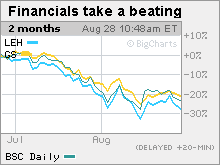Crunch time for bloodied Wall St. banksWall Street's leading firms have been pummeled by the downturn in financial markets - and there's no telling when the pain will end.LONDON (CNNMoney.com) -- The mortgage meltdown and credit turmoil have taken a heavy toll on stocks in the financial sector. The question now for investors: Is the selling over? Several Wall Street banks have been hit by the subprime mess - shares of Bear Stearns (Charts, Fortune 500) have plunged about 25 percent since the start of June. The mortgage crisis has ignited a credit crunch that has spread to the entire financial sector.
That's worrisome for investors because financial stocks represent nearly one-fifth of the S&P 500's market valuation, and a prolonged downturn in the banking sector could drag on the broader stock market. A lot of the sell-off in financial sector stocks has been fueled by uncertainty, according to Patrick Lemmens, a portfolio manager at ABN AMRO Asset Management who follows the financial sector. "Banks need to give better guidance on what their liquidity situation is like" to restore investor confidence, he said. As third-quarter results start to be released, investors may get a better idea of what shape the sector is in. The quarter is drawing to a close for investment banks like Bear Stearns and Lehman Brothers (Charts, Fortune 500), which will report results in the coming weeks. Commercial banks like JPMorgan Chase (Charts, Fortune 500) and Merrill Lynch (Charts, Fortune 500) won't post results until after their quarter ends next month. One of the biggest issues facing these firms is whether their assets are being properly valued on their balance sheets, according to Dick Bove, an analyst with Punk Ziegel. Wall Street firms have made a lucrative business packaging home loans into complicated securities and selling them to investors. These bundled securities have been wildly popular the past few years but a massive repricing of risk in the market has made valuing them practically impossible. "Right now nobody has a clue as to what anything is worth," Bove said. For banks which hold these products, "it appears they're going to have to do a lot of marking down on the value of their assets." Another source of pain for Wall Street banks is the freeze in the credit markets. Until recently, big banks have been eager to underwrite bonds and loans for leveraged buyout deals - debt they could easily turn around and sell to yield-hungry investors in the credit markets. But investors are shunning risk now and no longer have an appetite for these offerings. With no investors willing to buy the debt, banks have been left with an estimated $400 billion on their balance sheets. The cloud over banks isn't likely to lift soon. The tightening of credit is expected to lead to a tapering off of deal activity, which means banks are likely to see lower investment banking fees. Investment banking fees have been an important source of revenue for banks. They've been hefty - running as high as 5 percent of a deal - and financial sector earnings are likely to fall if deal activity dries up, according to Andrew Clare, a professor of asset management at London's Cass Business School. Banks also derive a portion of their revenue from slicing and dicing home loans into bonds or other debt instruments, a process known as securitization. Bear and Lehman rely on this more than their counterparts on Wall Street, but sector earnings overall are likely to be stressed if the mortgage sector doesn't recover. Investment banks will see parts of their business, such as asset-backed securitization, slow as risk is repriced in the markets, Lemmens from ABN AMRO said. Still, he's reasonably optimistic on the overall outlook for the sector. Credit markets should eventually return to normal, and these activities should recover along with them, he added. Financial stocks are starting to recoup some of the losses they've racked up in the past month, and the sector is due for a rebound, said John Hughes, managing director at Epiphany Equity Research. But a major bankruptcy or hedge fund collapse could send the sector into turmoil anew, he added. Everyone's worried about the "other shoe that might drop," he said. "If that happens, and we see [financial stocks] head down again, it's going to be a problem for the whole market," Hughes said. |
Sponsors
|

